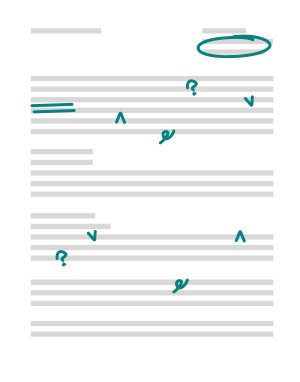How Many Jobs Should I Apply for at Once?

When job searching, you want to make sure you invest your time and effort wisely. You can spend hours searching for job postings, writing that perfect cover letter, and tailoring your resume. In addition to this, if you’re working or balancing other obligations, you’re probably wondering: how many jobs should I apply for at once?
There’s no magic number, as there are so many different circumstances, but our team sees the best results from applicants who apply to between 10 and 15 jobs per week. This range hits the sweet spot between relevant, tailored resumes and increased chances of success, as you can apply for multiple roles while still keeping a high standard of application every time.
The more opportunities you create for yourself, the more results you will see for the ideal application-to-response rate in 2023.
Why we recommend 10 to 15 resumes per week in 2023
Sending out between 10 and 15 top-quality job applications a week is a good target to aim for when wondering how many jobs you should apply for at once. This equates to applying to between two and three jobs a day.
The most effective way to organize your job search is to set aside two or three hours a day to apply for jobs that you know you’re qualified for with a tailored resume. This totals up to between 10 and 15 hours a week if you have weekends off. It might sound like a big chunk out of the working week, but if you put the effort in, the rewards will flood in.
Key Takeaway
Job seekers should focus on quality, not quantity, when applying for jobs. Between 10 and 15 applications a week is a good target.
Specific scenarios
However, with job seekers being at different stages of their careers and life, it’s not a one-size-fits-all. Check out the specific scenarios to guide you.
How many jobs should I apply for if I’m unemployed?
With time on your hands, it’s worth aiming higher than the average, increasing your applications to as many as five a day. If you aim for much more, you’re likely to burn yourself out, and the quality of your applications might dip below standard.
How many jobs should I apply for if I’m about to graduate?
If you’re finishing your studies, you could aim for the higher bracket as well, say 15 to 20 applications a week. This is because you’ll be up against a larger pool of applicants, especially if you’re applying at the beginning of the summer when all the exams are over.
How many jobs should I apply for if I’m already employed?
Working full-time, you probably won’t have huge amounts of spare time. But being in a job gives you leverage, so focus on sending out fewer but more finely tuned applications.
How many jobs should I apply for if I’m in senior management?
Higher-level jobs are fewer and far between, so the probability is there won’t be as many roles available as there are for positions further down the career ladder. One application a day is fine as long as it truly reflects your high level of expertise.
Benefits and disadvantages of sending out multiple applications
The advice is between 10 and 15 applications a week, but, as you can see above, different situations require a different number of applications. If you have the time and tenacity, you can send out many more than this.
See below for the benefits and disadvantages of doing so.
Benefits
Submitting lots of applications a day can reap rewards.
Maximizes your chances of success, as the more positions you go for, the higher the probability of landing a response.
Reveals best practice, as you’ll get more practiced at sending out applications over time, and we all know that practice makes perfect!
Latch onto new jobs straightaway, as you’re already in the zone and committed to a job search, so you’re more likely to see jobs as they’re posted.
Disadvantages
There can also be downsides to sending out loads of applications.
A decrease in quality because if you’re churning out loads of applications a day, the quality of each might be reduced as you’re more focused on quantity rather than quality.
Duplications, as many recruiters post openings on multiple job boards, so ensure you’re not applying to the same role through different avenues as it shows lack of attention to detail.
Multiple applications to the same organization, as this can come across as desperate instead of being committed.
5 tips to improve the quality of your job applications
1. Craft your resume with the ATS in mind
An effective resume has to use the right keywords based on the information found in the job posting. Many companies use Applicant Tracking Systems (ATS), and you need to get past those systems to be considered for an interview.
An ATS relies on keywords as part of its approval protocol. If your resume doesn’t contain the right words, you’re likely to get rejected for that job before a person has even viewed your resume. Instead, you should write your resume to include the right keywords and the right formatting for an ATS scan.
2. Highlight your achievements
Getting your resume past the ATS is important — but then you need to impress the hiring manager. You can do this by including those accomplishments that show how you went beyond what was expected in your previous roles.
Remember that there are 250 applicants for each corporate job opening in the US, so you really need your achievements to shine!
Wherever possible, use numbers to explain your impact or results. Hiring managers love tangible evidence that shows you can achieve!
Expert Tip
Professional resume writers at ZipJob know how to organize your resume in a way that will appeal to hiring managers. Check out our guide to the best resume writing services to find your perfect fit!
3. Only include relevant information
One of the biggest mistakes that job seekers make is including irrelevant information on their resume or in job applications. Read through each job description thoroughly before applying to ensure you’re only including the skills and experience that are relevant to that particular position.
Including irrelevant skills or experience can have a negative impact on your response rate!
There are several quick edits you can make to tailor your resume before submitting your job application. It might take time, but it will be worth it, so don’t skip this step!
4. Network
One of the best ways to land a job today is through networking. Many job seekers only apply for roles they find on popular job sites such as Indeed, but this really narrows your opportunities. Applying online is a hard way to land interviews.
Instead, reach out to your network on LinkedIn, and see if there is anyone who can refer you for a specific role or to the company you’re targeting.
Here is an example of what you could say when asking for job referrals:
Hi Anne,
Hope all is well with you. [Insert something personal here, or remind the person of how you know each other].
I'm wondering whether you have any contacts with your company’s hiring personnel and if you would be comfortable with making an introduction. If you feel that you’re familiar enough with my work history and skills to put me in contact with [hiring manager name], I would really appreciate it!
5. Follow up
You should always follow up after submitting your resume. Experts disagree on how soon and how many times, but not following up at all can put you at a real disadvantage. Use your best judgment, and remember to be polite!
Always remember, quality over quantity
To sum up how many jobs you should apply for, stick to sending out about 10 resumes a week. By focusing on the quality of applications rather than quantity, you’ll improve your response rate. Remember to tailor your resume and cover letter to each position you apply for.
Keep in mind that job searching usually means communicating with other people. Balance your time between job seeking, networking, and building those professional skills.
Getting your resume in ship-shape condition before applying for roles is essential. Turn to ZipJob’s free review for starters, and then get cracking with those applications!


